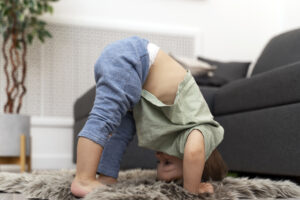Sensory development is crucial to your child’s early growth, affecting how they perceive and interact with the world around them. Sensory milestones include the development of sight, sound, touch, taste, and smell, as well as the coordination of muscle movements. Tracking these milestones can help you ensure your child is developing appropriately and provide early interventions if necessary. This guide covers key sensory development milestones from infancy through the toddler years and offers tips for supporting your child’s sensory growth.
Sensory Development Milestones in Infants (0-12 Months)
During the first year of life, infants undergo rapid sensory development, laying the groundwork for more complex sensory processing skills.
0-3 Months:
- Sight: Newborns can focus on objects about 8-12 inches away and are attracted to high-contrast patterns.
- Hearing: Babies respond to loud noises with a startle reflex and begin to recognize familiar voices.
- Touch: Infants have a strong grasp reflex and enjoy skin-to-skin contact.
- Taste and Smell: Newborns show a preference for sweet tastes and are comforted by the scent of their mother.
4-6 Months:
- Sight: Babies start to track moving objects and recognize familiar faces from a distance.
- Hearing: They begin to turn their heads toward sounds and enjoy listening to different pitches and tones.
- Touch: Infants explore objects with their hands and mouths, learning about texture and shape.
- Taste and Smell: Babies show interest in different flavors and smells, often expressing likes and dislikes.
7-12 Months:
- Sight: Infants develop depth perception and can judge distances, which helps them reach for and grasp objects accurately.
- Hearing: They imitate sounds and enjoy interactive games like peek-a-boo and pat-a-cake.
- Touch: Babies start to use a pincer grasp to pick up small items, enhancing their tactile exploration.
- Taste and Smell: Infants become more adventurous with foods, often trying a variety of tastes and textures.
Early Signs of Developmental Delays
While variations in development are normal, certain signs may indicate a delay that requires further assessment. Here are some early indicators in different age groups:
Infants (0-12 Months):
- Not responding to loud sounds or not turning to locate sounds by 6 months
- Inability to hold up their head or push up on their arms by 3-4 months
- Lack of babbling or cooing by 9 months
- Not sitting independently by 9 months or not crawling by 12 months
Toddlers (1-3 Years):
- Not walking by 18 months
- Limited or no engagement in pretend play by age 2
- Difficulty understanding simple instructions by age 2
- Limited vocabulary (less than 15 words) by 18 months, not combining words by age 2
- Lack of interest in interactive games like peek-a-boo or not pointing to things by 18 months
Preschoolers (3-5 Years):
- Trouble with learning to use utensils, crayons, or dressing themselves by age 3
- Difficulty forming simple sentences by age 3-4
- Limited interest in playing with peers by age 4
- Difficulty recognizing colors, shapes, or numbers by age 5
- Inability to follow simple instructions or focus on tasks by age 5
Sensory Development Milestones in Toddlers (1-3 Years)
As children enter the toddler stage, their sensory development continues to evolve, providing them with a richer understanding of their environment.
12-18 Months:
- Sight: Toddlers can see well both near and far and enjoy looking at pictures in books.
- Hearing: They follow simple directions and start to name objects and people they recognize.
- Touch: Toddlers enjoy sensory play, such as playing with sand, water, and play dough.
- Taste and Smell: They become more discerning with food preferences, sometimes exhibiting picky eating behaviors.
18-24 Months:
- Sight: Toddlers recognize and point to pictures in books and can differentiate between colors.
- Hearing: They understand and respond to more complex sentences and enjoy listening to songs and stories.
- Touch: Sensory play becomes more intentional, with activities like stacking blocks or stringing beads.
- Taste and Smell: Toddlers continue to explore new foods and may start to show preferences for specific flavors.
2-3 Years:
- Sight: Children can match objects to pictures and start to recognize letters and numbers.
- Hearing: Toddlers engage in simple conversations, ask questions, and enjoy rhyming games.
- Touch: Fine motor skills improve, allowing them to engage in more detailed sensory activities like drawing and cutting with child-safe scissors.
- Taste and Smell: They may become more adventurous with food, willing to try new dishes and flavors.
Supporting Sensory Development
Parents play a vital role in fostering their child’s sensory development. Here are some tips to support these milestones:
- Provide a Stimulating Environment: Offer a variety of sensory experiences, such as different textures, colors, sounds, and smells. Rotate toys regularly to keep the environment engaging.
- Engage in Sensory Play: Activities like playing with sand, water, clay, and sensory bins help develop tactile and fine motor skills. Musical toys and instruments can enhance auditory development.
- Read and Sing Together: Reading books with large pictures and singing songs with actions can support visual and auditory development while promoting bonding and communication skills.
- Encourage Exploration: Allow your child to explore their surroundings safely. Take them on nature walks, visit different environments, and expose them to new experiences.
When to Seek Professional Help
While every child develops at their own pace, certain delays in sensory milestones may warrant a consultation with a pediatrician or developmental specialist. Seek help if your child:
- Does not respond to loud noises or familiar voices for 3 months.
- Has trouble focusing on or tracking objects by 4-6 months.
- Shows no interest in exploring objects or textures by 9 months.
- Demonstrates significant aversion to specific textures, sounds, or lights.
- Does not follow simple instructions or engage in interactive play by 2 years.
Early intervention can provide the necessary support to help your child thrive in their sensory development.
Tracking sensory development milestones is significant for ensuring your child’s overall growth and well-being. By providing a stimulating environment and engaging in sensory play, you can support your child’s sensory development effectively. If concerns arise, consult with professionals to address any potential delays early on.
Every child is unique, and sensory development varies from one child to another. Celebrate your child’s achievements and continue to provide opportunities for them to explore and learn about the world around them. By being attentive and proactive, you can help guide your child through the incredible journey of sensory development, setting a solid foundation for their future learning and growth.
However, if you have concerns about potential delays, early intervention is important. The Child Development Checker app offers a convenient way for parents to assess developmental delays and potential genetic concerns from home. This AI tool further connects you with trusted health professionals for tailored support and guidance based on the assessment results. By staying attentive and proactive, you can help your child navigate the journey of sensory development, laying a strong foundation for their future learning and growth.
Evaluation
Don’t let your questions stay questions
Ease your concerns, gain a better understanding of your child’s development process, and connect with medical professionals in your area.

